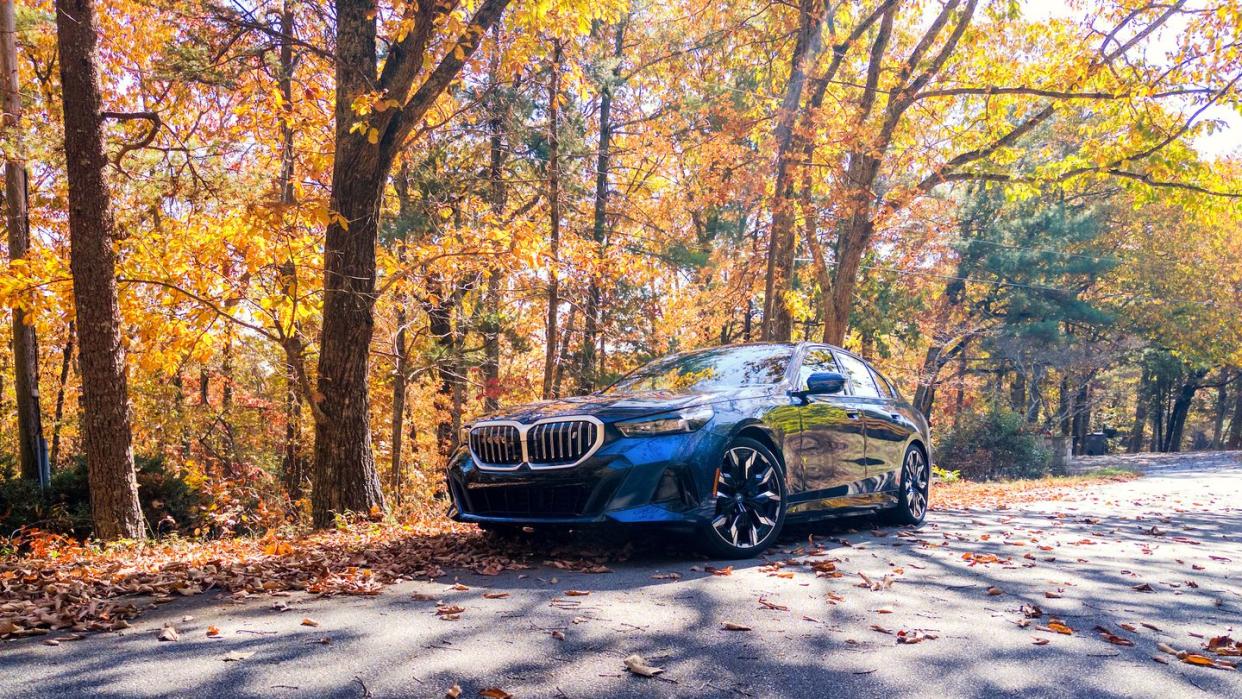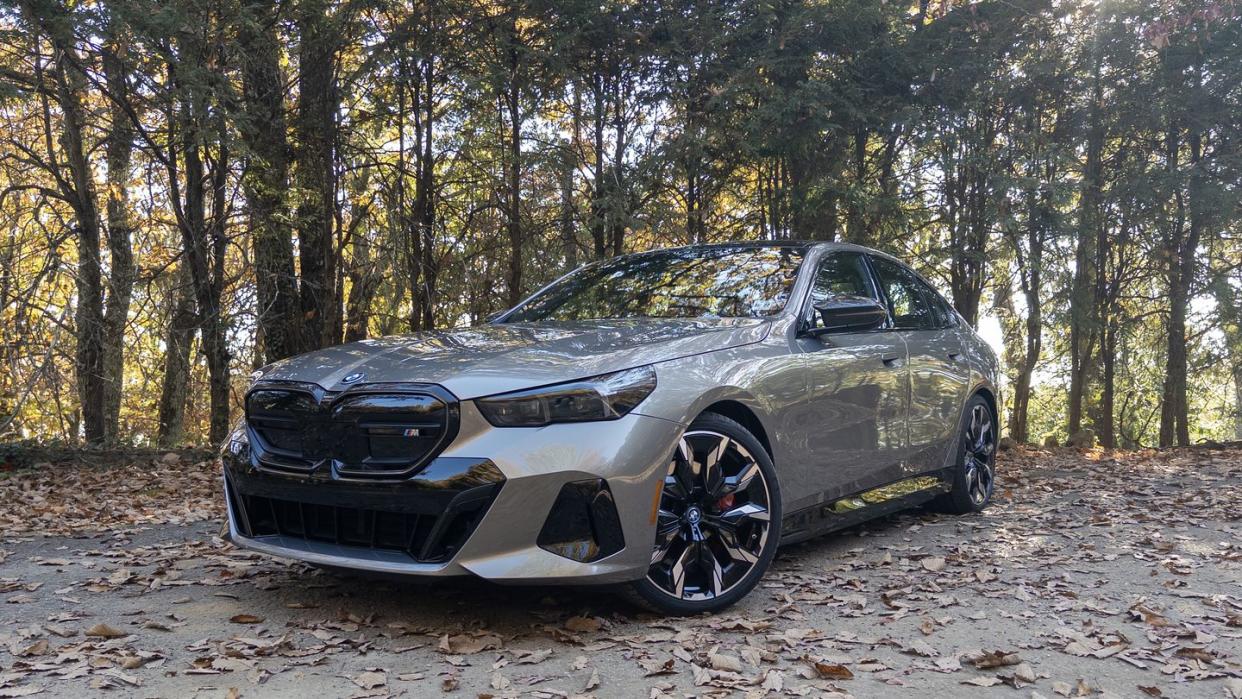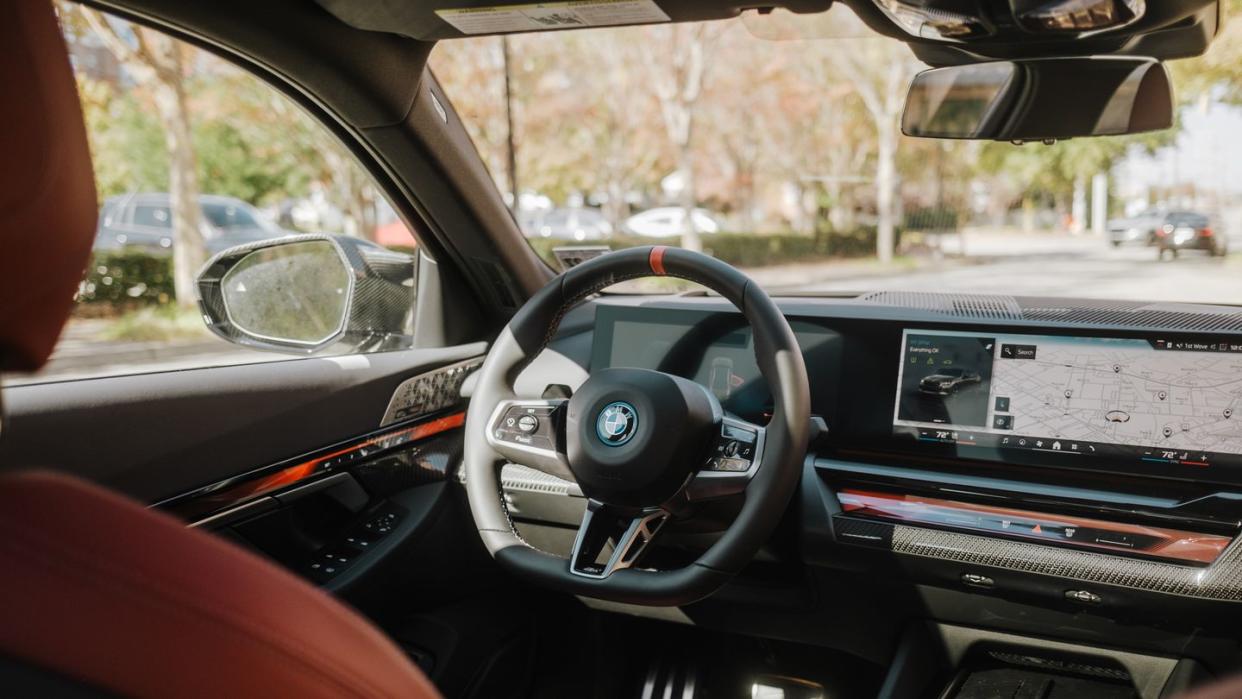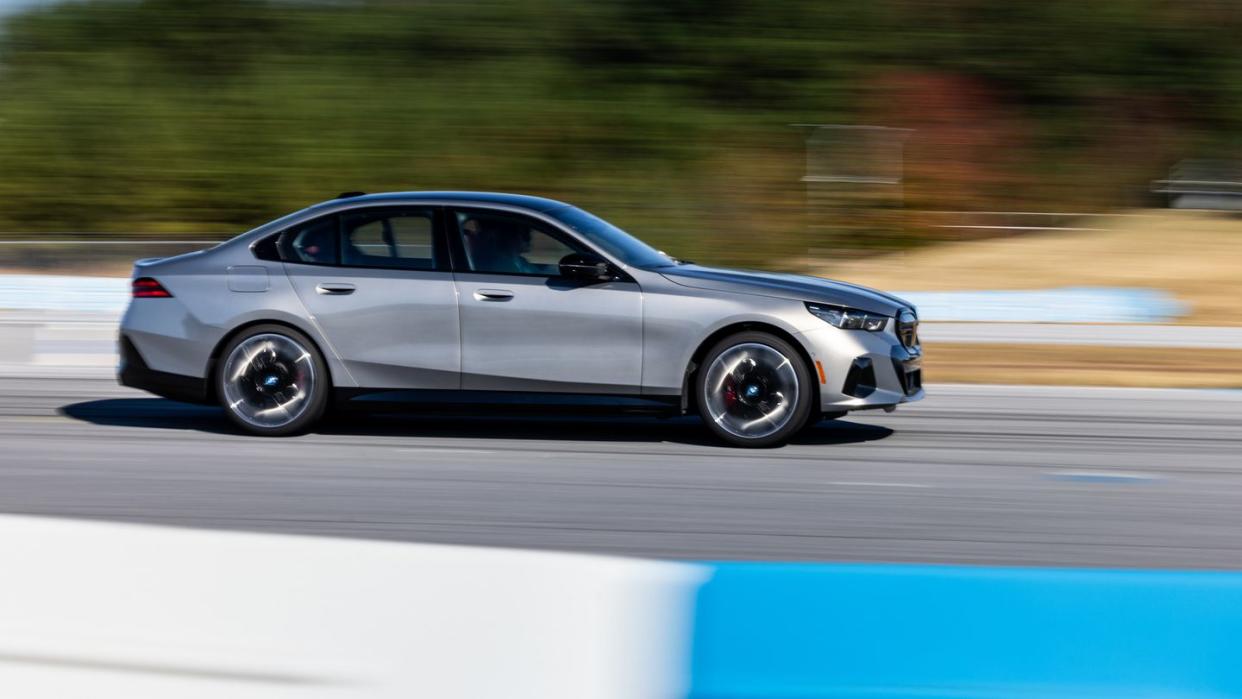The 2024 BMW i5 Is Best Enjoyed in Rear-Wheel-Drive Form

BMW's electric strategy is mercifully simple: Selling EV versions of its long-running and well-understood lineup alongside their internal-combustion counterparts. The i5 is an electric 5 Series. New for the 2024 model year and sharing the same underpinnings as the new gas-powered 5er, the i5 is offered in single-motor eDrive40 and dual-motor M60 guises.
Every year, BMW puts on a week-long event for the press to drive the newest cars in its lineup. It was our first chance to experience the new G60-generation 5 Series in any guise, and we chose to focus on the two electric models.
They're big cars, about as large as a 7 Series from a decade ago and quite a bit taller than the old 5 Series as a result of the 81.2-kWh battery mounted in the floor. Inside, the i5 is reminiscent of the new 7 Series though not quite as extroverted and opulent. The i5's cabin is more traditional BMW, understated, solid, and packed with tech that's among the best out there. Livening things up is a light-up panel that runs in segments along the dash and on the doors, which changes color depending on driving mode or by user selection.

The 593-hp all-wheel-drive M60 is the headline-getter, but we started our day in the rear-drive eDrive40. This is one of those cars that feels great immediately. The refinement stands out most. Despite the testers on hand sitting on non-adaptive M Sport suspension (all i5s get self-leveling air springs) and 21-inch wheels, ride and refinement is exquisite. On rough concrete roads outside Greenville, South Carolina, the i5 eDrive40 glides along in near silence. It moves with grace over large road surface changes, and all the little bumps and dips are damped away to the point of near-nonexistence. And what little external noise enters the cabin is ably drowned out by the optional Bowers and Wilkins surround-sound system.
Power delivery is very well metered out. In today's world of heady EV horsepower figures, 335 hp from the i5's rear motor doesn't seem like much, yet it's more than plenty. Torque is 295 lb-ft, but if you pull the "boost" paddle on the left side of the steering wheel, that figure rises to 317 lb-ft for 10 seconds. Be judicious with the throttle, and there's enough power to pin you back in the seat, though it's never sudden or jerky.
In fact, all of the inputs are great. The steering is well-weighted and the brake pedal gives no hint that it's blending motor regeneration and friction. At nearly 5000 pounds, this is a very heavy car, though it never feels cumbersome. The tight, twisty roads of Greenville's Paris Mountain State Park revealed that the i5 was capable of carrying great speed with ease. You're not left wanting for a stiffer suspension mode, either, as the body control and damping are excellent. The car feels rear-wheel-drive, too, with steering not compromised by big torque demands and the rear momentarily breaking traction if you're a little overeager with the right pedal. (All i5s come with summer performance tires, which offer lower rolling resistance than an all-season. The 21s on this tester were fitted with BMW-spec Continentals.)
There's something of the classic BMW sedan here—everything in balance. The right amount of power, the right amount of grip, the right blend between sport and luxury, the right amount of tech.

The M60 amps everything up. A 257-hp motor driving the front wheels brings output up to 590 hp and 605 lb-ft of torque (when you pull the boost paddle). M60s also get a unique suspension tune with standard adaptive dampers, and the requisite M Sport styling elements. Our tester also had the $3600 Dynamic Handling Package, which includes active anti-roll bars and a rear-steer system.
It's important to note that this is not a full-on M car. Rather, it's an M Performance model, a diet M, if you will. Yet, it accelerates like an M5, which isn't terribly surprising when you consider the i5 M60 is just seven hp shy of the outgoing M5 and torquier to boot. Still, it's nearly 1000 pounds heavier at 5247 pounds, so don't expect this to carve up a race track like an M5.

There's nothing wrong with the M60, and the acceleration is quite fun, but something was lost in the i5's transformation to M Performance model. If you only drove the M60, you'd probably like it, but back-to-back drives with the eDrive40 show that the quicker car isn't as sweet. The ride is harsher, if still very livable, and the chassis somehow feels more inert. Outside of acceleration, these cars are not night and day different, but the added weight, complication, driven wheels, and chassis tech dilute the i5's simple goodness.
We did a few laps around the BMW Performance Center's handling course in the i5 and while the car proves to be capable, its weight prevents it from being a true track car, not built for serious lapping. It's too easy to overtax the front tires and push into understeer, and once the initial hit from the two motors dissipates, it doesn't feel all that quick. Moreover, you have to be super careful metering out the power in slow corners. I won't hold that against the M60, though, since this was a fairly extreme test and again, it's not an M5.
All this hits at an interesting problem for EV makers: How do you make your performance versions interesting? With the old, gas-powered 5-Series, the change from 540i to M550i brought a huge shift in character as the two had entirely different engines, a straight-six and a V-8. Other than in off-the-line acceleration, the powertrains of i5 eDrive40 and M60 feel identical. How, beyond acceleration, do you justify the price increase?

On that note, the i5 starts at $67,995 while the price rises to $85,095 for the M60. Our testers were $78,995 and $97,495 as equipped. In either case, it's a huge price jump for straight-line speed and unique trim.
The eDrive40 is actually something of a bargain. The base i5 is easily as nice as the Genesis Electrified G80 (which is offered in a single, well-equipped $81,495 trim) while offering superior interior space and infotainment tech; the milquetoast Mercedes-Benz EQE starts at $76,050; a Tesla Model S costs $76,380 and feels leagues behind the BMW in terms of quality; the rear-drive Lucid Air Pure, which I am told is very good, costs $78,685 and comes from a company with a very uncertain future.
Dynamically excellent, luxurious, and well-priced, the i5 eDrive40 is hard to argue against. The efficiency perhaps isn't the best, with a range of 295 miles when fitted with 19-inch wheels, a figure that drops to 270 with the 21s you see here, yet fast-charging speeds of up to 205 kW make up for this.
Beyond all that, the rear-drive i5 reminds us of why we all love BMW in the first place. It is simply excellent.
You Might Also Like
